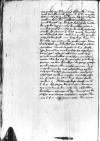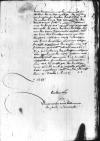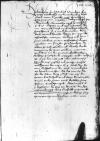List #2668
Gdańsk Town Council do Ioannes DANTISCUSGdańsk (Danzig), 1543-10-20
| odebrano Heilsberg (Lidzbark Warmiński), 1543-10-24 Rękopiśmienne podstawy źródłowe:
| ||||||
Tekst + aparat krytyczny + komentarzZwykły tekstTekst + komentarzTekst + aparat krytyczny
Dem Hochwirdigstenn in Gott Furstenn unnd Herrenn, herrenn
Hochwirdigster inn Gott Furst, gennediger herr.
Unnser bereidtwillige unnd unvordrossene dinste seindt Ewern H(ochwirdigen) Gnaden mith besunderen vleis zcuvorann entpholenn. /
Gennediger herr.
Wier seindt alles czweiffels anigk es werd(en) sich E(wer) H(ochwirdige) G(nade) leichtlich unnd woll erinneren kommen was reyffsennigk(?) unnd trostlichs bedenck zcwusschenn E(wer) H(ochwirdige) G(nade) unnd den andern
Wie das auch E(wer) H(ochwirdige) G(nade) sambt dem herrenn  BCz, 1624, p. 200 uns groslich unnd dienstlich bedanncken. / Solchs auch herwidderum(m)be jegenn E(wer) H(ochwirdige) G(nade) unnsers bestenn vleisses zcuvordienen stets unvordrossen wollenn befunden werdenn. / Derhalbenn unnd dieweill nhu die zceitt faste vorbeÿ laufft, damith dennoch immers dem selbigen guttenn unnd zcutreglichen rathe in der thadt nachgeseczt wurde. /
BCz, 1624, p. 200 uns groslich unnd dienstlich bedanncken. / Solchs auch herwidderum(m)be jegenn E(wer) H(ochwirdige) G(nade) unnsers bestenn vleisses zcuvordienen stets unvordrossen wollenn befunden werdenn. / Derhalbenn unnd dieweill nhu die zceitt faste vorbeÿ laufft, damith dennoch immers dem selbigen guttenn unnd zcutreglichen rathe in der thadt nachgeseczt wurde. /
So ist ann E(wer) H(ochwirdige) G(nade) unnser dienstlich unnd fleissigk bytt wolle inn gnaden geruchen solche furdershrifft ann hochgedochte
Welche obgedochte brieffe wolle E(wer) H(ochwirdigen) G(naden) beÿ zceiger dieses, unserm diener, an uns mith dem ersten neben der abshrifften derselbigenn gelangen lossen. / Damith wir dieselbigen ungesewmet vortstellenn muchten, dan wier E(wer) H(ochwirdige) G(nade) nicht vergen wollen, / das wier  BCz, 1624, p. 201sernn secretarium
BCz, 1624, p. 201sernn secretarium
Wollenn wier herwidderum(m)be jegenn Ewer H(ochwirdige) G(nade) in allem wolgefallenn / zcuvordienen unvorgessenn sein, / mit der hulffe Gots, der die selbige lange gesundt unnd in vorhoffter gluckszeligkeit enthaltenn wolle. /
Dat(um)
E(wer) H(ochwirdige) G(nade)n bereidtwillige



